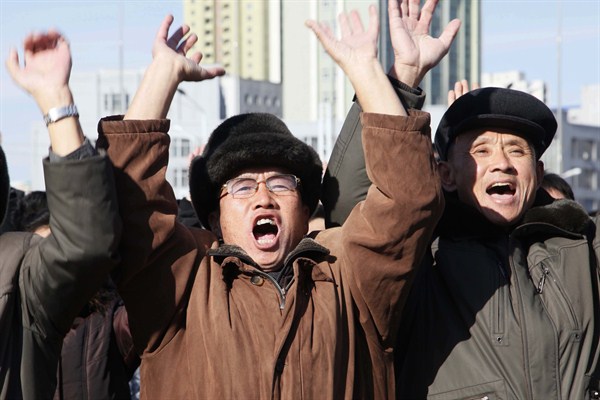After a two-month lull in activity, North Korea on Tuesday successfully tested its largest and most powerful missile to date, which it claims puts the entire U.S. mainland in range. Washington responded by calling for all countries to sever diplomatic and economic ties with Pyongyang, and vowed to further ramp up sanctions. Amid fears that the U.S. and North Korea are inching closer to war, WPR has collected 10 articles examining what options remain on the table—and if any can lead to a way out of the crisis.
Purchase this special report as a Kindle e-book.
Kim Builds an Arsenal
Now That North Korea Has Nukes, What Will It Do With Them?
North Korea’s recent string of successful nuclear tests caps a startling progression over the past 11 years from buffoonish nuclear aspirant to serious nuclear threat. Every bit as remarkable as North Korea’s march toward becoming a nuclear weapon state is the stagnation in U.S. policy responses over the same time, Judah Grunstein wrote in September. Now, war cannot be ruled out as a possibility.
North Korea’s military output isn’t confined to its nuclear program. Earlier this year, a ship from North Korea laden with 30,000 rocket-propelled grenades was seized off the coast of Egypt. In an email interview published Monday, Andrew C. Winner discusses how North Korea’s illicit global arms trade continues to bring profit to the Kim regime despite increasingly harsh international sanctions.
Despite its assertions of autonomy, Pyongyang is acutely aware that its dependence on a single geopolitical ally and trade partner leaves it deeply vulnerable to outside pressure. As long as North Korea is unable to become a conventional member of the international community, Benjamin Katzeff Silberstein argued in May, its economy will remain hostage to Chinese policy whims.
Washington Weighs Its Options
While some members of Trump’s team have made overtures to Pyongyang, the president himself appears committed to brinkmanship. Ellen Laipson wrote last month that by rebuking his own diplomats’ efforts, Trump has turned the North Korea crisis into a laboratory experiment about how to avoid war: with words, or with more demonstrations of force?
The Trump administration is talking up preventative military action as a legitimate possibility to the North Korea crisis. Steven Metz wrote last month that the repercussions of a military strike wouldn’t just be devastating to the Korean Peninsula; they would be global in nature, coming back to hit the United States both directly and indirectly.
In March, The New York Times reported that the U.S. had secretly stepped up cyberattacks against North Korea’s missile program during President Barack Obama’s second term. Responding to the revelation, Andrew Futter argued that Trump should think long and hard before continuing down this path. While there may be short-term benefits to cyberwar, it could also usher in a new era of nuclear threats.
Diplomacy on the Ropes
Since the division of the Korean Peninsula at the end of World War II, there has been a distant hope in diplomatic circles and among many Koreans that the split might one day be undone. Zach Montague explained last month why this aim today seems more quixotic than ever. As tensions flare, it may be time to abandon reunification and let more promising policies take precedence.
Pyongyang’s nuclear and missile programs pose an existential threat to the stability of the Korean Peninsula. Naturally, the issue dominated the agenda during Donald Trump’s tour of the continent earlier this month. Ellen Laipson previewed his nearly two-week trip by discussing the complex regional dynamics that will need to be navigated to find a way out of the crisis.
There is a general, if vague, sense that the United Nations or some neutral powers could help construct a framework for engagement to seek a way out of the impasse over North Korea’s nuclear program. But beyond China and Russia, Richard Gowan asked in September, can the rest of the U.N. really do anything to assist?
Any U.N. resolution to rein in North Korea must go through the Kremlin. Syria showcased Russia’s capacity to game the U.N. system, Richard Gowan wrote in September, and now Moscow has begun flexing its diplomatic muscles over North Korea, too. Russia appears intent on using the U.N. to complicate any American efforts to put pressure on Pyongyang.

